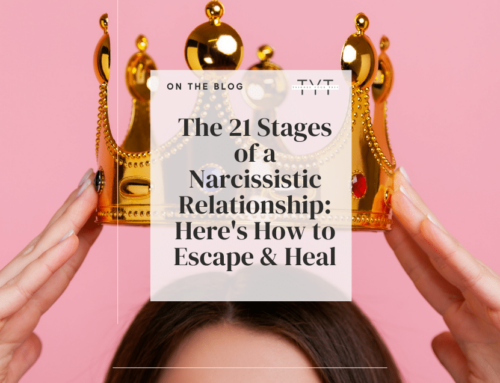Have you ever felt like an ex-partner or family member who exhibits narcissistic traits and from whom you tried to keep distance is trying to ‘hoover’ or engage you back into their life after a harsh period of no contact? If so, then it’s likely that the individual in question is exhibiting what’s called “narcissistic hoovering behavior.”
Understanding the narcissist’s common tactics can help you respond better and protect yourself from being manipulated or drawn back into their toxic realm.
What Is Narcissistic Hoovering?
Narcissistic hoovering, a cunning and abusive manipulation tactic employed by narcissists, is designed to draw their victims back into toxic relationships from which they manage to break free to protect their mental health. This behavior is named after the Hoover vacuum cleaner, as it resembles an attempt to “suck” the person back in.
This insidious behavior typically manifests after the victim’s triumphant escape, taking on various deceptive forms such as excessive flattery, menacing threats, feigned helplessness, false promises of change, or even superficial acts of kindness and care.
The primary objective remains consistent: to erode the victim’s determination to set boundaries and render them more susceptible to the abuser’s insidious manipulation, perpetuating the cycle of abuse.
Read more: Reactive Abuse & Narcissism: What Is It & How To Deal With It
The Different Types of Hoovering
According to social psychology, there are quite a few different types of hoovering that can be employed as a form of emotional abuse;
Borderline Hoovering
This type of hoovering often involves making false promises of a changed attitude.
The individual will cunningly attempt to lure the victim back into a toxic relationship, claiming they are actively taking concrete steps towards meaningful self-improvement, but it can also take other forms, such as excessive apologies, declarations of love, or even self-harm threats and guilt-tripping.
It’s not uncommon for people who employ borderline hoovering tactics to threaten that they will harm or even kill themselves to manipulate the victim and grab their attention.
Borderline hoovering is often associated with individuals with borderline personality disorder (BPD). It’s not uncommon for a person with BPD to attempt to draw someone back into a relationship or maintain control over them after a breakup or period of separation with statements such as: “I changed behavior, and I can prove it to you this time.” or “Answer to me, or I’ll cut myself.”
It is typically driven by an intense fear of abandonment and a desperate desire for validation and closeness. It’s often a temporary ploy to regain emotional support or exert control, and it can be emotionally draining for the target.
Narcissist Hoovering
The narcissist hoovering technique is a manipulative strategy a narcissistic partner or ex employs to regain control over their victims. It subtly pressures the victim by making them feel guilty or ashamed for not wanting to reconnect.
The manipulator effectively plants seeds of doubt and self-questioning by exploiting the survivor’s innate compassion and empathy through this guilt-tripping. An example of this type of hoovering is: “I booked this trip for us for next month because I want to see you, but it’s fine if you don’t want to see me. I was never important to you anyway.”
This psychological manipulation tactic preys upon the victim’s feelings, leaving them vulnerable and unsure of their own judgment and making them leave their own best interests behind for the perpetrator with a narcissistic personality disorder.
Read more: 9 Glaring Signs a Narcissist Is Done With You (& How to Heal)
Antisocial Hoovering
The antisocial form of hoovering involves using fear and intimidation as manipulative tactics to bring the victim back into a relationship.
The abuser, in their pursuit to regain control, resorts to threats (both explicit and implied), aiming to instill deep-seated fear in their target. An example of antisocial hoovering is when the abuser says, “If you don’t meet me, I’ll send your naked pictures to everybody.” or “I’ll keep you locked inside the car until you admit that you love me.”
This insidious form of hoovering poses an especially grave danger as it relies on the infliction of physical and mental abuse to exert power and maintain control.
It is crucial to recognize the signs of antisocial hoovering and take proactive measures to seek support and safeguard oneself to avoid the detrimental effects of this pervasive form of emotional abuse.
Read more: How Does a Narcissist React When They Can’t Control You?
Attachment Hoovering
A narcissist employs attachment hoovering to create an unbreakable bond with their victim. In this insidious form of hoovering, the manipulator will cunningly utilize various tactics to establish a deep connection.
They may feign vulnerability, spread lies or false narratives of mutual understanding and compassion, or exploit shared interests to establish an emotional tie with their victim. You might hear them say, “Nobody will understand or love you like do,” “You know we’re soulmates,” or “I will always care about you; that’s why I want to learn news from you from time to time.”
This calculated manipulation can leave the victim feeling a sense of intense connection to the abuser, making them want to respond to their manipulation, even when they desperately desire to break free or create healthy boundaries.
Read more: Dismissive Avoidant Attachment: The Push & Pull That Destroys
What Will Trigger a Narcissist to Hoover?
Narcissists will often resort to hoovering tactics when they find themselves in a situation where their sense of superiority and control is threatened by losing their target. Their narcissistic void needs to be filled with narcissistic supply.
This can occur when they have failed in their attempts to regain their lost control -such as when the target is using distancing behaviors or when their victim successfully escapes from an abusive relationship.
However, it is essential to note that a hoovering attempt of narcissistic abuse is not limited to situations involving a recent breakup.
It is a manipulative tactic that can be insidiously employed in various other settings, not just by a narcissistic ex or former partner, but also in different relationships such as those in the workplace, with family members, or even among friends.
By understanding the broader scope of narcissism and hoovering, one can better understand, protect oneself from its harmful effects, and respond with firm boundaries.
Read more: Trapped in a Narcissistic Relationship Pattern? The 7 Awful Signs
Different Signs of Narcissist Hoovering
Gift-giving & love-bombing
Gift-giving and love-bombing are two common signs of a hoovering attempt by a narcissistic abuser.
The manipulator may use these tactics to shower the victim with compliments, lavish them with gifts, or surprise them with romantic gestures to restore their connection.
This sudden display of attention is often used as bait to make the victim feel special and open themselves back up to mental health distress within a toxic relationship.
Read more: 5 Weird Things Covert Narcissists Do & Ways to Protect Yourself
Apologizing
Apologizing and feigning change are also ways that a narcissist uses hoovering tactics.
The individual may frequently apologize for their past misdeeds in a calculated attempt to make the victim believe that they have truly changed and are now ready to take concrete steps towards meaningful self-improvement, only to be disappointed later.
Narcissists often use this false sense of remorse to erode the victim’s boundaries and play with their feelings to further their agenda and regain the power they once had.
Read more: Can a Narcissist Change And Form a Healthy Bond?
Out of the blue, contact
Out-of-the-blue contact is another classic sign of hoovering, where the perpetrator will often reach out unexpectedly, through text messages, email, or phone calls, to reestablish communication and rebuild their connection with their victim.
With this cunning tactic, they manage to regain control over the recipient’s feelings to return to their life.
Threats and Intimidation
In some cases, narcissists may resort to threats and intimidation to manipulate the victim into returning to their life.
This form of hoovering is hazardous since it involves exploiting the recipient’s fears and vulnerabilities to make them sacrifice their mental health and conform to the manipulator’s wishes.
Gaslighting
Narcissists often use gaslighting to engage with their victims when they use hoovering.
In this insidious approach, the manipulator deliberately utilizes fabricated and distorted memories or baseless accusations to sow seeds of doubt within their target’s mind.
By systematically undermining their victim’s self-esteem and making them question their own judgment, the abuser aims to render them more susceptible to complying with their coercive demands.
Read More: Narcissist Gaslighting: 19 Ways to Spot This Dangerous Abuse
Manipulative behavior
Narcissists that use hoovering often involve the use of manipulative behavior.
They may be willing to do anything to bring their victims back into their life as their family, ranging from promises of gestures and false displays of affection to utilizing overly apologetic behavior or even bribery.
The narcissist will attempt to create an atmosphere where the victim believes they cannot live without them or that they are in some way obligated to act on their wishes.
Grand gestures
Finally, narcissists may resort to grand gestures to get what they want.
They may promise the world and offer extravagant gifts or favors that appear too good to be true, all trying to seduce their victim into accepting them back into their life.
However, beneath the surface, these grandiose offers are often hollow and devoid of any real substance. They are nothing more than a facade, as the narcissist’s true motive is to gain control and exert power over others by any means necessary.
Read more: 35 Best Karma Narcissist Quotes That Will Shake Your World
Fake excuses and emergencies
In some cases, narcissists may also employ deceptive tactics by creating elaborate fake excuses and pretending they have “a life emergency” to manipulate their victims.
They will go to great lengths to fabricate compelling stories, such as self-harm or fatal injuries, desperately seeking assistance and invoking pity to engage with the person.
The victim must be vigilant and recognize these ploys, responding with unwavering firmness and protecting themselves from exploitation.
Read More: The Narcissist Prayer: How To Dive Into the Narcissistic Soul
What Happens If You Ignore Narcissist Hoover?
It is important to know that ignoring a narcissist does not mean they will stop hoovering you. Not responding to their texts might be perceived as a “game” and offer them the thrill of the chase.
Narcissism is a complicated personality disorder, and ignorance may create an attention fix and provoke them to intensify their efforts and attempt to manipulate you even more aggressively.
In such cases, it is essential not to let the guilt take over and to remain steadfast in your clear boundaries.
Cutting off a narcissist by simply responding kindly yet indifferently may benefit you in the long run, as it takes away their power and gives you control over your life, mental health, and well-being.
It also allows them to realize that they cannot always get what they want or dictate the terms of the relationship, which can help them come to terms with reality and accept responsibility for their actions.
By choosing not to give in to their hoovering attempts by meeting or investing energy in their stories, you demonstrate that their actions are unacceptable and the power dynamic is no longer in their favor. This may cause them to leave their extreme highs and give up eventually.
Read More: 15 Obvious Female Narcissist Traits & Ways to Protect Yourself
How Long Do Narcissists Hoover?
The duration of a narcissist’s hoovering attempts usually depends on various factors, including the individual’s level of neediness, attachment style, and the victim’s response.
Generally speaking, the narcissist may use hoovering for anywhere between a few days to several months. Sometimes, it may persist for years, mainly if the narcissist is deeply emotionally invested in the victim.
It is crucial to understand that waiting for the narcissist to give up or hoping their hoovering will cease is futile. Ignoring their tactics alone will not be fruitful. Instead, taking control of the situation and prioritizing yourself without guilt is imperative.
This involves actively rejecting their manipulative tactics, establishing healthy boundaries, and reinforcing autonomy.
By setting clear limits and refusing to engage in their toxic behavior, you can gradually detach yourself from the unhealthy attachment with a narcissist. Remember, it is not your responsibility to fix or change the narcissist.
Instead, it is your responsibility to break the cycle of narcissistic abuse. Focus on healing and surround yourself with supportive relationships promoting positivity and growth.
Read More: The 150 Top Shadow Work Prompts to Unblock Your Potential
About The Narcissistic Abuse Cycle
The cycle of narcissistic abuse is highly detrimental to both parties involved. It inflicts immense emotional damage on the victim, leaving lasting scars while simultaneously reinforcing the narcissist’s sense of superiority and power.
The victim should never feel guilty for wanting to break free from this toxic dynamic, no matter how deep their care for their abuser may be. It takes immense strength and courage to recognize the need for change and self-care in such situations.
Professional help can be beneficial for both the victim and the narcissist. For the victim, a therapist can help them heal from the trauma, identify the abusive patterns in their relationship, and learn to establish boundaries.
It can also provide a safe space for victims to express their feelings and process their experiences without fear of judgment or criticism.
For the narcissist, a therapist can provide an opportunity to reflect on their narcissism and gain insight into its root causes. Additionally, it can help them understand the impact of their actions on others and develop healthier relationships and strategies for self-regulation.
With the proper guidance, narcissists can learn how to break out of these patterns of abuse and gain control over their emotions.
Read More: Therapy for Narcissistic Abuse: The 5 Best Affordable Alternatives
Final Thoughts
Narcissistic hoovering is a manipulative tactic narcissists use to assert control and power in their relationships. While it can be difficult for the victims of narcissistic abuse, understanding its dynamics and recognizing its patterns can help them break free from the cycle and reclaim their autonomy.
Seeking therapy is also recommended, as it gives both parties an opportunity to gain insight into their behavior and learn healthier coping strategies.
Victims need to prioritize themselves and support their healing journey to break free from the cycle of narcissistic abuse. It is of utmost importance to always remember that victims should never feel obligated to remain in toxic relationships. They have the right to prioritize their own well-being and happiness. By practicing self-love, care, and setting boundaries, they can gradually reclaim their power, rebuild their self-esteem, and restore their sense of dignity.
This healing journey empowers them to move forward confidently into a brighter and healthier future where they can thrive and find genuine happiness.







